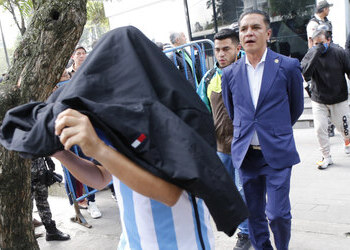The arrest of over two dozen judges and top security personnel in Ecuador may reveal major corrupt links between officials and organized crime in the country and serve as a needed, if controversial, win for new President Daniel Noboa.
On December 14, hundreds of prosecutors and police officers raided the offices of Ecuador’s Judiciary Council, which regulates the country’s courts and judges, as well as the homes of several dozen judges, police commanders, and other officials.
The most high-profile arrests were those of Judiciary Council president Wilman Terán, former national prisons director, Pablo Ramírez, and ten active and former judges across eight provinces.
“Narcopolitics has been revealed in Ecuador,” said attorney-general Diana Salazar in a statement published on social media. A sprawling investigation into links between security and judicial officials and Ecuador’s gangs revealed that criminal leaders paid off corrupt officials who oversaw their cases to obtain favorable rulings, Salazar revealed.
SEE ALSO: The Rise and Fall of the Choneros, Ecuador’s Drug Trafficking Opportunists
On December 6, President Noboa, who took office in November, threatened to name and shame judges and prosecutors who let criminals walk free in comments made to local media.
Terán posted a video of his arrest, in which he said the move was “illegal and arbitrary.” The Judicial Council he presided over also strongly protested Terán’s arrest, describing it as a smear campaign.
Corruption allegations within Ecuador’s judiciary are nothing new. In 2022, 24 judges and 30 prosecutors were under investigation for corruption and links to drug trafficking.
But this latest investigation was sparked by the October 2022 murder of Leandro Norero, one of Ecuador’s leading drug traffickers. The accused officials were allegedly part of a criminal network led by Norero, the details of which emerged after a search of his cellphone, according to legal documents seen by Ecuadorean newspaper La Hora.
Norero was a highly influential criminal figure, having founded the Chone Killers, one of Ecuador’s main gangs, and reportedly helped broker cocaine deals with Mexico’s Jalisco Cartel New Generation (Cártel Jalisco Nueva Generación – CJNG). He was shot dead in prison in October 2022, another high-profile casualty of Ecuador’s gang war.
InSight Crime Analysis
These sweeping raids are a political win for Noboa, who has been slow in revealing his exact security plans. But questions remain over the strength of the evidence and the political implications of the investigation.
“This definitely benefits Noboa’s government, but it mostly benefits the Attorney General’s Office,” said Carla Álvarez, a security policy investigator at Ecuador’s National Institute of Higher Studies (Instituto de Altos Estudios Nacionales – IAEN). “Because this is occurring as the police, armed forces, and judiciary have been seriously infiltrated by drug trafficking.”
In her address, Salazar mentioned that Norero had been working closely with Agustín Intriago, the former mayor of Manta, an important drug trafficking hub along the Pacific Coast, who was shot dead in July 2023.
SEE ALSO: From Rhetoric to Reality on Ecuador’s Security Challenge
Controversy is dogging the public perception of this operation, however.
For the moment, no direct link between Norero and Terán has been revealed in any of the evidence presented, furthering allegations of political motivations.
Terán was overseeing a politically loaded process that could have seen 40 percent of judges in the country removed from office or confirmed in their positions. It was feared that former president Rafael Correa was using this renewal process to try and place judges loyal to him in key roles.
Finally, the lack of criminal specifics in the charges filed against Terán and his co-defendants may mean the case is weaker than it may seem.
“The fact that [the defendants] are being investigated and may be sentenced only for organized crime is worrying. If they enter a guilty plea, they can … obtain a minimum sentence of approximately one year,” said Renato Rivera, director of the Ecuadorian Observatory of Organized Crime at the Pan American Development Foundation.
While the ramifications of these arrests will play out in the weeks ahead, they may not fully silence criticism of his security strategy.
The mayor of Guayaquil, Aquiles Alvarez, has publicly lambasted the lack of any concrete information coming from the Noboa government. The city where Noboa’s family made a fortune in the banana trade has been Ecuador’s criminal hub for years, with extortion and gang violence continuing to worsen.

